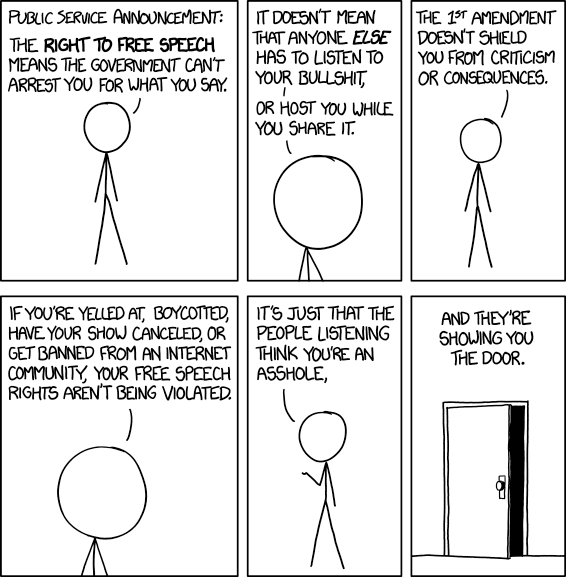Section 230 Should Be Protected
I’m going to preface this by saying that I am by no means an expert when it comes to all the nuances of Section 230 of the Communications Decency Act. I do however know that Section 230 serves as the underpinning of how the current Internet works and why all the sites that we all love can survive and exist.
For even better coverage of Section 230, I’d highly recommend you follow Techdirt and Mike Masnick on Twitter.
The biggest thing Section 230 provides is protection for website owners from content their users post. It means that when a user posts a Tweet or someone posts on Facebook, Twitter and Facebook aren’t held legally responsible should user post libel or anything else that might open them up for legal repercussions. I can’t even begin to imagine how many issues website owners would have without this protection...especially smaller sites with comment sections. It also gives them the protections to moderate their sites however they choose without having to worry about it affecting their protection.
Now we can certainly debate HOW sites like Twitter or Facebook moderate their users, but that doesn’t change how important Section 230 is for today’s internet. Think about YouTube. YouTube has hundreds of hours of video uploaded by users per minute. There is absolutely no way that they can check each and every video as they’re uploaded. They don’t have the manpower...no company does. Automation and A.I. might help some, but they often create many false positives or miss things altogether. Imagine if someone uploads an awful video and Google is responsible for the contents of the video even if it’s only online for a short period before they remove it. If they could be held liable for that, it would be disastrous. There's no way they couldn’t take that risk. If companies as big and as resourceful as Google can’t do it, what hope do smaller site owners have?
I write this now as Donald Trump, the U.S. Department of Justice and Republican Senators are trying to gut these protections. Joe Biden isn’t much better as he’s no real fan of Section 230 either. This is all a mistake. Section 230 makes the Internet a much more diverse and better place. It’s ironic too, because while Trump is hating on Twitter now, he’s benefitting from Section 230. Without Section 230, Twitter would likely be driven to completely remove many of Trump’s Tweets...rather than just putting a violence or misleading tag.
Publisher vs. Platform (It Does Not Mean What You Think it Means)
One of the common arguments against sites like Facebook and Twitter is the false “publisher versus platform” distinction. This doesn’t mean what many seem to think it means. So many arguments I’ve seen is “Twitter has to choose between being a publisher or being a platform...since they’re moderating, they’ve chosen publisher!” (or something along those lines)
Let’s look at Twitter as en example. It’s generally considered a platform since they host other users’ content. But it can also publish its own content like their blog and whatnot. Twitter is not responsible for its users' Tweets, but it IS responsible for content it posts itself. That’s essentially what the whole distinction is. It’s not really an either/or proposition.
The 1st Amendment Argument Against Social Media is Bullshit
There’s been a lot of complaints from those primarily in the GOP and on the right about social media being biased against conservatives. I personally find their claims dubious at best, but they seem to believe that sites like Twitter are responsible for holding up the standards of the 1st Amendment and Freedom of Speech. What they seem to forget, is that these sites are private companies. They are not the government, so the 1st Amendment does not apply to them. Social media sites have to determine how best to moderate their community. If they’re too open, they could drive away users who might be disgusted by questionable content. If they’re too strict, they could also drive away users as the majority of people do appreciate and want the ability to freely express themselves. But this is for the sites to decide, not the government.
At the end of the day, Twitter, Facebook, and every other site have the ability to moderate their sites as they see fit. If users don’t like it, they can find a different community or start their own. The alternative is that the government regulates what users can post on social media which would likely abused by whichever political party is in power. I think we can all agree that would be bad.

